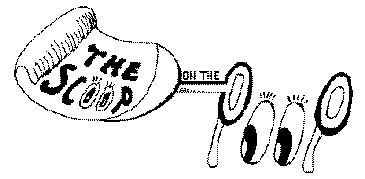| The Scoop on the Poop | |||||||||||
| |||||||||||
|
||||||||

Epizootic Catarrhal Enteritis (E.C.E.), a viral diarrhea. Also known as The Greenies, Green Slime or Green Diarrhea. The following information is provided to help identify the onset of E.C.E., the signs, the stages and some simple but life-saving steps to take. Please read in its entirety to recognize all of the signs and the effects. Green Slime - Smells and looks like fish glue along with projectile vomiting. You may notice that the ferret is or has been restless and irritable, sometimes digging frantically in bedding or litter box. Also, it may aggravate other cage mates. Fast for 24 hours, feeding Pedialyte + water. Ferrets dehydrate very quickly so it is essential to start fluids right away and keep them warm and quiet. Runny yellow/gold diarrhea (sometimes bubbly). Many times this is the second stage, but often times this can be the first stage with little or no green slime. Because of this, many ferret owners and vets are not recognizing it as E.C.E. Keep feeding Pedialyte/water mix, leaving in water bottle and a bowl. Some ferrets do not have enough strength to drink from a bottle. Start ferret on soft food diet, i.e. Science Diet A/D plus baby food, or baby food (chicken) alone. Coax the ferret to lick from your finger then encourage it to eat from a small, shallow bowl. If it refuses, feed by syringe. Start out with 10-20cc's every 3 hours. Increase up to 30-40cc's three times a day. It is essential that your ferret eats. Your veterinarian should be consulted and advised of your ferret's status as subcutaneous or intravenous fluids may be necessary if it refuses to eat! There is a considerable amount of water in soft foods, so you may notice a decrease in water intake. DO NOT BE FOOLED! Check frequently by pinching the scruff of the neck. If the skin does not snap right back but sticks together, your ferret could be dehydrated. If necessary, call your vet to administer fluids. Your ferret may be extremely lethargic for at least 48 hours with eyes narrowed and watery. Many times ferrets sleep right next to the litter box for frequent defecation. Please keep the box clean and sanitized! Always keep warm blankets or towels nearby as body temperature drops with dehydration. If diarrhea continues, consult your veterinarian for the type of medication and amount to be given, i.e. Pepto Bismo, Pepcid AD, Immodium AD. After 48 hours, many ferrets seem to recover. Once again, DO NOT BE FOOLED. This is the most crucial period! If the poop returns to normal and the ferret is once again eating hard food, decrease soft food feeding to 25cc, twice a day. Many young ferrets and healthy ones will heal rapidly, however, BE ALERT FOR THE NEXT STAGE. Golden piles of jelly containing grainy material that looks like birdseed. Unmistakable! Once again, you may never see the other two stages, but if you see this stage, GREAT DANGER EXISTS. At this point the ferret is not digesting its food and more than likely, it is not eating but using up its own stored body fat, hence a rapid decline in weight, not noticed sometimes until 10 days to 2 weeks after onset of E.C.E. Keeping the ferret hydrated and feeding the soft food diet is imperative. Be ever watchful. If grinding of teeth is evident when feeding, more than likely ulcers are present, preventing the ferret from eating. We found Carafate liquid, 1cc given about 1 hour before feeding, to be very effective. PLEASE CONSULT YOUR VETERINARIAN These are the signs and stages to watch for and the steps you can take. Please consult a veterinarian familiar with the disease or a local/national ferret shelter that has had considerable experience with E.C.E. There are a lot of so called cures and various treatments, however, from my experience with 150 ferrets exposed at the same time, I appreciated most of all the advice given by Dr. Bruce Williams (Armed Forces Veterinary Pathologist researching the virus): The most crucial care is supportive care! This proved to be the case and many lives were saved. Many times older ferrets, especially those between 2-4 years develop complications that will need careful monitoring by your and your veterinarian. Those with Insulinoma/Hypoglycemia suffered the worst. Perhaps medications will be need for secondary infections or to control a medical problem that surfaces due to the inability of the immune system to cope with the diarrhea. The most important aspect of ferret ownership is to KNOW YOUR OWN FERRET. You will then recognize any changes in its physical or behavioral patterns. Keep a diary from the beginning and you may be able to save your ferrets life!
|
||||||||
|
|
||||||||